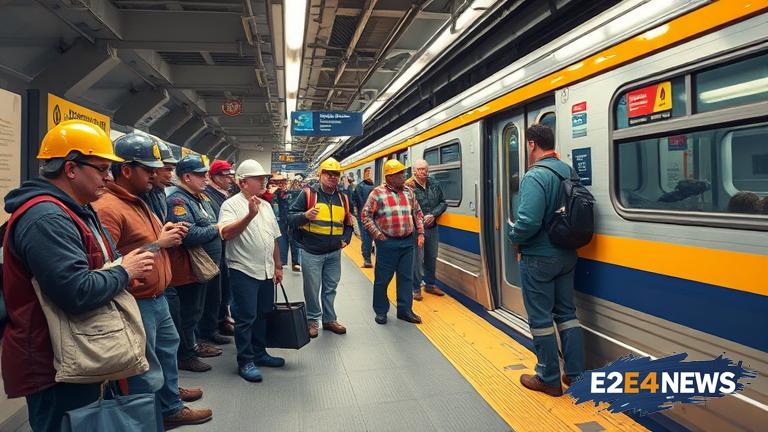The Metropolitan Transportation Authority (MTA) is under fire from unions for its handling of workers’ compensation payments. According to reports, numerous MTA employees have experienced significant delays in receiving their workers’ compensation benefits, leading to financial hardship and emotional distress. The union representing MTA workers has expressed outrage over the situation, citing the MTA’s failure to prioritize employee welfare and labor rights. The MTA has a long history of providing workers’ compensation benefits to its employees, but recent changes to the system have led to a backlog of claims and delayed payments. The union argues that the MTA’s actions are unacceptable and that immediate action is necessary to address the issue. The MTA has responded to the criticism by stating that it is working to improve the efficiency of its workers’ compensation system, but the union remains skeptical. The dispute highlights the ongoing tensions between the MTA and its unionized workforce, with labor rights and employee benefits being a major point of contention. The MTA’s handling of workers’ compensation payments has also raised concerns about the authority’s commitment to providing a safe and healthy work environment for its employees. The union has called for increased transparency and accountability within the MTA’s workers’ compensation system, as well as more robust support for employees who are injured on the job. The MTA has faced criticism in the past for its handling of employee benefits and labor relations, and the current dispute is likely to further strain relations between the authority and its workforce. The issue of workers’ compensation payments is not only a concern for MTA employees but also for the broader labor movement, as it highlights the challenges faced by workers in securing fair compensation and benefits. The MTA’s response to the crisis will be closely watched by labor unions and advocacy groups, who are pushing for greater protections and support for workers. The authority’s handling of the situation will also have implications for its relationships with other labor unions and employee groups, and may impact its ability to negotiate future contracts and agreements. The dispute over workers’ compensation payments is a complex issue that involves multiple stakeholders and competing interests, and a resolution will require careful negotiation and compromise. The MTA must balance its financial constraints with its obligations to provide fair compensation and benefits to its employees, while also ensuring the safety and efficiency of its operations. The union, on the other hand, must advocate for the rights and interests of its members, while also working to find a solution that is acceptable to all parties. The outcome of the dispute will have significant implications for the MTA, its employees, and the broader labor movement, and will likely be closely watched by observers and stakeholders. The MTA’s commitment to providing a safe and healthy work environment, as well as its handling of employee benefits and labor relations, will be subject to intense scrutiny in the coming months. The authority’s response to the crisis will be a major test of its leadership and its ability to manage complex labor relations issues. The union’s advocacy efforts will also be critical in shaping the outcome of the dispute and ensuring that the rights and interests of MTA employees are protected. The issue of workers’ compensation payments is a critical one that requires immediate attention and action, and the MTA and the union must work together to find a solution that is fair, equitable, and sustainable. The MTA’s handling of the situation will have long-term implications for its relationships with its employees, as well as its reputation and credibility as a responsible and responsive employer. The dispute highlights the need for greater transparency, accountability, and cooperation between the MTA and its unionized workforce, and underscores the importance of prioritizing employee welfare and labor rights. The MTA must take immediate action to address the backlog of workers’ compensation claims and ensure that employees receive the benefits they are entitled to in a timely and efficient manner. The union will continue to advocate for the rights and interests of MTA employees, and will work to ensure that the authority is held accountable for its actions. The outcome of the dispute will depend on the ability of the MTA and the union to work together to find a solution that is acceptable to all parties, and that prioritizes the welfare and interests of MTA employees.
